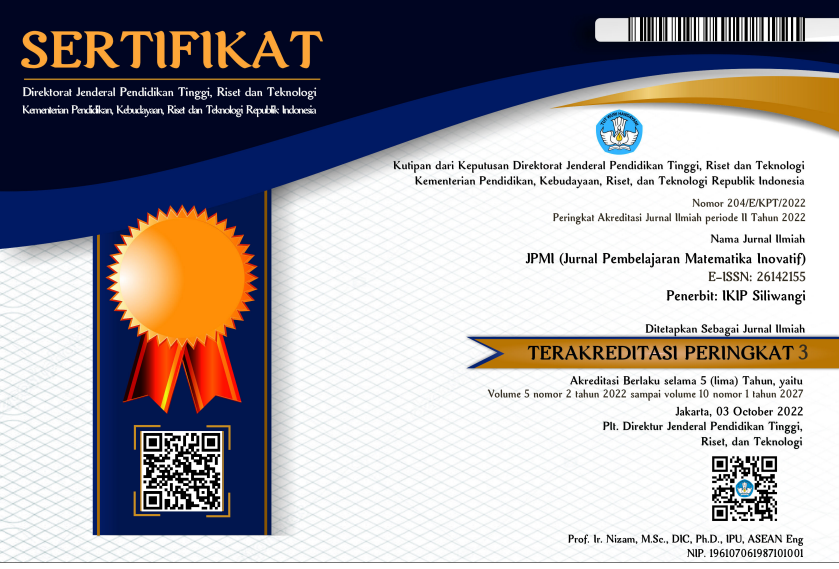Penerapan model discovery learning untuk meningkatkan kemampuan berpikir kritis siswa pada materi aritmatika sosial
DOI:
https://doi.org/10.22460/jpmi.v6i6.17622Keywords:
Discovery learning, critical thinking skill, social arithmatics materialAbstract
This research is motivated by the importance of knowing the mathematics learning model to improve students' critical thinking skills on social arithmetic material. This study aims to describe the effectiveness of the discovery learning model to improve students' critical thinking skills on social artifacts. This study uses a quantitative approach using a quasi-experimental method. The population of this research is class VII SMPN 6 Cimahi. The sampling technique used sampling technique. Class VII A and VII B research samples. The research instruments used were test questions and observation sheets. The data analysis technique used is prerequisite analysis and hypothesis testing. The results of the research show that the discovery learning model is effective for increasing students' critical thinking skills in social arithmetic material. This is shown through the results of the t-test using the independent sample t-test obtained a significant value at (2-tailed) = 0.012. The results of the t test show that the application of the discovery learning model applied in class VII A causes an increase in students' critical thinking skills.
References
Arikunto, S. (2005). Manajemen penelitian. (p. 44). Jakarta: Rineka Cipta.
Aripin, U., Setiawan, W., & Hendriana, H. (2019). Critical thinking profile of mathematics in integral materials. Jurnal of Educational Expert, 2(2), 97-106. https://journal.kopertis-4.org/index.php/jee/article/view/54
Chandra Novtiar, U. A. (2017). Meningkatkan kemampuan berpikir kritis matematis dan kepercayaan diri siswa SMP melalui pendekatan open ended. Jurnal Prisma, 4(2), 119-131. https://jurnal.unsur.ac.id/prisma/article/view/122
Diantini, F. N. (2015). Efektivitas model discovery learning dalam meningkatkan kemampuan generating materi larutan elektrolit dan non elektrolit. Jurnal Pendidikan dan Pembelajaran Kimia, 4(2), 391-402. http://jurnal.fkip.unila.ac.id/index.php/JPK/article/view/9181
Joko Subiono, W. (2020). Efektivitas model discovery learning dan inquiry terhadap keterampilan berpikir kritis pada mata pelajaran matematika siswa kelas 5 SD. Jurnal Karya Pendidikan Matematika, 7(1), 69-75. https://jurnal.unimus.ac.id/index.php/JPMat/article/view/5573
Lieung, K. (2019). Pengaruuh model discovery learning terhadap keterampilan berpikir kritis siswa sekolah dasar. Musamus, 1(2), 73-82. https://journal.upy.ac.id
Nabela, ,. M. (2020). Pengaruh guided discovery learning terhadap kemampuan berpikirs kritis matematis siswa SMPN 6 Singkawang. J-PiMat, 2(1), 116-125. https://journal.upy.ac.id
Nugraha, G. S. (2020). Penerapan model ldiscovery learning untuk meningkatkan kemampuan berpikir kritis matematis siswa SMK. Jurnal PJME, 10(1), 78-87. https://journal.upy.ac.id
Prasetyowati, E. &. (2016). Peningkatan penguasaan konsep dan keterampilan berpikir kritis siswa melalui implementasi model pembelajaran inkuiri pada materi larutan penyangga. Jurnal Kmia dan Pendidikan Kimia, 1(1), 67-74. https://jurnal.uns.ac.id/jkpk/article/view/10122
Pratiwi, F. H. (2014). Pengaruh penggunaan model discovery learning dengan pendekatan saintifik terhadap keterampilan berpikir kritis siswa SMA. Jurnal Pendidikan dan Pembelajaran, 3(7), 1-16. https://jurnal.untan.ac.id/index.php/jpdpb/article/view/6488
Purwanto, C. N. (2012). Penerapan model pembelajaran guided discovery pada materi pemantulan cahaya untuk meningkatkan berpikir kritis. Unnes Physics Education Journal, 1(1), 27-32. https://journal.unnes.ac.id/sju/index.php/upej/article/view/768
Putri, D. R. (2017). Pembelajaran discovery learning untuk meningkaktkan efikasi diri dan penguasaan konsep siswa. Jurnal Pendidikan dan Pembelajaran Kimia, 6(2), 296-307. http://jurnal.fkip.unila.ac.id/index.php/JPK/article/view/13306
Sanjaya, W. (2009). Strategi pembelajaran berorientasi standar proses pendidikan dalam implementasi kurikulum berbasis kompetensi. Jakarta: Kencana.
Santoso. (2000). Statistik parametrik. Jakarta: PT Elexmedia Kompitindo.
Sardiyo. (2015). Peningkatan kemampuan guru dala pengelolaan pembelajaran yang melalui kegiatan supervisi akademik. Jurnal Teknodika, 13(1), 20-34. https://jurnal.fkip.uns.ac.id/index.php/teknodika/article/view/6775
Sisriawan Lapasere, M. P. (2017). Pengaruh model pembelajaran kooperatif tipe STAD berbasis mind mapping terhadap keterampilan berpikir kritis sisw pada konsep gerak lurus di SMA Negeri 1 Ampibabo. Jurnal Pendidikan Fisika Tadulako, 5(3), 1-6. http://jurnal.untad.ac.id/jurnal/index.php/EPFT/article/view/8863
Slameto. (2015). Belajar dan faktor-faktor yang mempengaruhinya. Jakarta: Rineka Cipta.
Surip, M. (2014). Berpikir kritis analisis kajian filsafat ilmu. Jakarta: Moeka Publishing.
W. Kariasa, I. M. (2014). Pengaruh model pebelajaran kooperatif tipe STAD dengan pendekatan pemecahan masalah tehadap kemampuan berpikir kritis matematis ditinjau dari penalaran formal. Jurnal Pendidikan dan Pembelajaran Matematika Indonesia, 3(1), 1-14. https://ejournal-pasca.undiksha.ac.id/index.php/JPM/article/view/1347
Windi Oktaviani, F. K. (2018). Penerapan model pembelajaran discovery learning untuk meningkatkan kemampuan berpikir kritis dan hasil belajar matematika siswa kelas 5 SD. Jurnal Basicedu, 2 (2), 5-10. https://jbasic.org/index.php/basicedu/article/view/137.
Downloads
Published
Issue
Section
License
Copyright (c) 2024 JPMI (Jurnal Pembelajaran Matematika Inovatif)

This work is licensed under a Creative Commons Attribution-ShareAlike 4.0 International License.
The author is responsible for acquiring the permission(s) to reproduce any copyrighted figures, tables, data, or text that are being used in the submitted paper. Authors should note that text quotations of more than 250 words from a published or copyrighted work will require grant of permission from the original publisher to reprint. The written permission letter(s) must be submitted together with the manuscript.
















